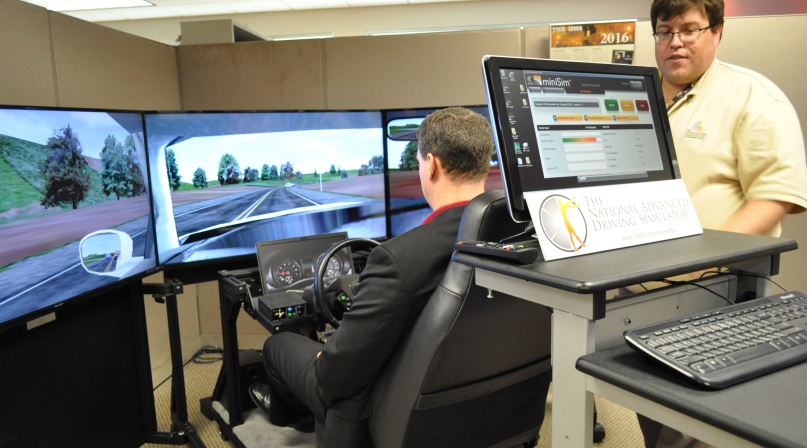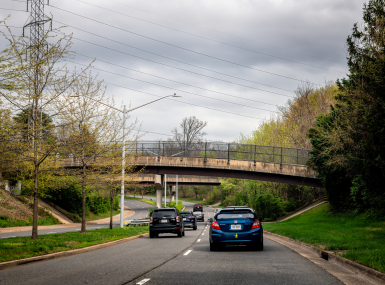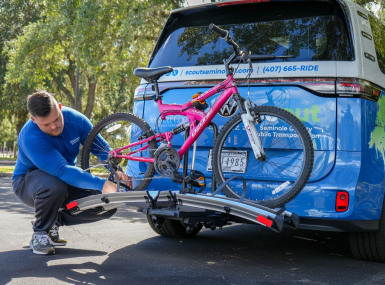On the road in Iowa for county innovations in transportation
Upcoming Events
Related News

Matt Smith drives a mini-simulator, under the instruction of Tim Brown, a University of Iowa researcher. Photo by Jenna MoranCounties are testing ways to integrate technology and transportation systems
Over the past few years, technological innovations in transportation have accelerated at a rapid pace, from connected and autonomous vehicles to open data sourcing to smart transit.
Manufacturers, federal government leaders, software developers, auto companies and universities are currently imagining and testing new ways to optimize transportation systems with this integrated technology.
County governments are no exception. Counties across the country have begun to take steps to prepare for these changes.
In 2014, Johnson County, Iowa and Fayette County, Ga. passed separate resolutions encouraging the testing of autonomous, or self-driving, vehicles on county-owned roads. Both saw an opportunity to court manufacturers and software developers not only to prepare their roads for the future but also to boost their local economies.
Other counties across the nation have taken the initiative to implement their own connected and autonomous vehicle test beds such as Contra Costa Transportation Authority’s GoMentum Station in Contra Costa County, Calif. and the Anthem Connected Vehicle Test Bed in Maricopa County, Ariz. Both seek to develop safer, more reliable transportation efficiency by reducing congestion.
On May 12 and 13, NACo gathered county elected officials, county professional staff, state association staff, federal and state agency officials, and industry experts from across the country in Johnson County, Iowa, to explore counties’ role in leveraging technological and data innovations to improve local and regional transportation planning and operations.
Additional Resources
Attendees learned about the rapidly changing field of smart technologies and began to get a sense of what next steps might be good to take. Speakers included representatives from the Michigan Department of Transportation and Maricopa County, Ariz., Fayette County, Ga., and Contra Costa County, Calif.
Bryan Desloge, NACo first vice president, remarked, “It’s always beneficial for county elected officials and staff to learn about what is going on in other parts of the country. This focus on lessons learned and best practices is something I want to continue in my presidential year.”
Iowa was the ideal location to hold a peer exchange, since the Iowa Department of Transportation, under the guidance of Iowa DOT Director Paul Trombino, is pursuing a wide range of strategies to improve operations and promote Iowa-based businesses. These range from analyzing global economic and shipping trends as they affect Iowa farmers and manufacturers, to rethinking how new vehicle technologies can improve residents’ daily lives.
Johnson County is also home to the University of Iowa’s National Advanced Driving Simulator, which researches transportation safety and human behavior using a suite of driving simulators and instrumented vehicles.
“By staying ahead of these trends, county leaders can better align strategic county investments in local transportation systems to improve both goods and passenger movement and to support local and national economic competitiveness,” said Bill Peterson, Iowa State Association of Counties executive director.
The peer exchange was developed with the support of the Federal Highway Administration. As part of this work with FHWA, NACo recently released a publication, Connected Counties: Tech Innovations in Transportation, as well as offering a webinar, Keeping Counties Moving: Technological Innovations in Transportation.
Through case studies, both of these resources give an overview of how counties are using new technologies to improve transportation systems and ready them for the future.
Attachments
Related News

Local government organizations send letter in support of the BASICS Act to congressional leaders
On February 16, nearly 80 state associations of counties and municipal leagues representing local governments in all 50 states sent a letter to the leaders of the U.S. House Committee on Transportation and Infrastructure and the U.S. Senate Committee on Environment and Public Works expressing their support for the Bridges And Safety Infrastructure for Community Success (BASICS) Act (H.R. 7437) and urging its inclusion in the next surface transportation reauthorization bill.

U.S. House members introduce NACo-endorsed, bipartisan BASICS Act to improve transportation programs for local infrastructure
On February 9, Reps. Kristen McDonald Rivet (D-Mich.) and Robert Bresnahan (R-Pa.) introduced the Bridges And Safety Infrastructure for Community Success (BASICS) Act.
